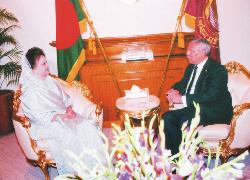Powell's
Vague Agenda
Ahmede
Hussain
Widely
known as doveish in the neo-con administration, US Secretary
of State Colin Powell's much hyped visit on June 20 encompassed
a large number of issues: duty-free access of Bangladeshi
goods to the US market, continued US investment, bilateral
trade and the bizarre US National Security Entry and Exit
Registration System (NSEERS). The 'visit' that lasted less
than six hours, failed to address the issues regarding the
diplomatic and trade relationship of the two countries in
the aftermath of 9/11.
Powell assured Dhaka that it would consider giving it a
duty-and-quota-free access of goods to the US market, according
to local newspaper reports. Though US has already extended
the facility to many African and Caribbean countries, the
carrot of free access to the US market has been dangling
before the country since its independence.
On the NSEERS, under which 7,238 Bangladeshis have so far
registered and 25 are arrested, US Secretary of State told
the newsmen in Dhaka, “ The NSEERS is necessary to protect
us and our security. I hope Bangladeshis will understand
it.” No promises were made this time on exempting Bangladesh
from the list of countries the US reckons as the producers
of potential terrorists. The Bangladesh government has done
nothing so far to protest this opprobrious law which has
exposed its 2.5-lakh citizens staying in the US, to routine
humiliation.
Bangladesh's relationship with the US dates back to the
days of the country's independence war. United States, because
of the war's socialist allegiance, had actively supported
Pakistan with diplomatic support and military logistics.
The US tried several times to stop the war at the United
Nations' Security Council but failed after facing several
vetoes by the then Soviet Union. On the eve of our liberation
on December 16, 1971, US sent its Seventh Fleet to the Bay
of Bengal as a last resort to meddle in the course of our
war of independence.
After the liberation, during the rule of Sheikh Mujibur
Rahman, US suddenly stopped aid, commonly known as PL-480.
It paved the way for a famine and political instability
that in turn resulted in a military coup, which killed almost
all the members of Sheikh Mujib's family.
The country gained the geo political importance it had enjoyed
during the so-called cold war after the discovery of natural
gas. US investment in Bangladesh has surged to a mammoth
$2 billion from an almost zero, followed by former US president
Bill Clinton's brief visit to the country, immediately after
a bigger portion of natural gas was found in Bangladesh.
The visit generated much controversy though, after the US
president failed to go to the national Mausoleum to pay
homage to the martyrs of liberation war citing security
ground.
The two country's relationship took a new turn after the
September 11 terrorist attack on the Twin-Towers in New
York. Bangladesh actively supported the war on terrorism
and the US led war on Afghanistan. But the relationship
has soured after US listed Bangladesh under NSEERS.

Visiting
US Secretary of State Collin Powell talks to the prime minister
at the prime minister's office.
Bangladesh,
like many other Muslim countries, fiercely opposed the war
on Iraq and the subsequent US led occupation of the country.
On his brief stopover, Collin Powell's suggestion on sending
Bangladeshi troops to post-Saddam Iraq was vague: “ We discussed
it but I made no special request for that. I leave the matter
with Bangladesh government, prime minister, cabinet and
the legislature to decide on an appropriate way of deployment
of troops”.
Bangladeshi Foreign Minister M Morshed Khan's comment on
the visit was equally nebulous. The visit helped “to promote
of economic growth and reforms, expansion of democracy and
the advancement of women and Bangladesh's integration into
the global mainstream,” he informed the press.
'The carrot of free-access' took a new shape when the US
administration has made a proposal to provide tax-free-special-commercial
facilities to 18 Muslim countries in lieu of giving diplomatic
recognition to Israel. The bill, dubbed Middle East Trade
and Engagement Act, was sent to Economic-relation committees
on May 22 from the US senate, Prothom Alo ran the story
on its front page on June 24. The government wants to watch
the move of other Muslim countries, the report said.
Political observers believe building a diplomatic relationship
with Israel, long been seen as an occupier of the Holy Land,
will be politically suicidal for the BNP led centre-right
government. But Bangladesh can hardly afford to lose this
overture from a country, which buys one- third of its total
export.
|

